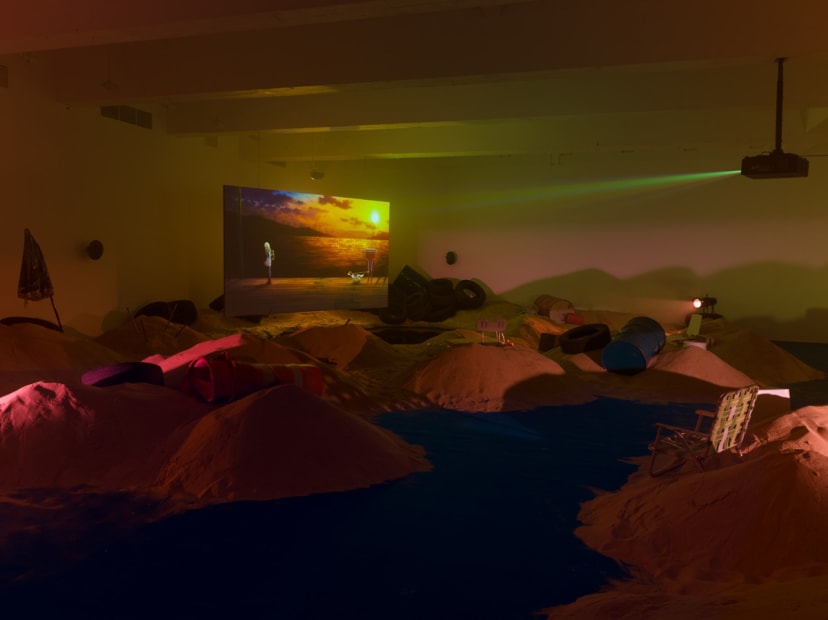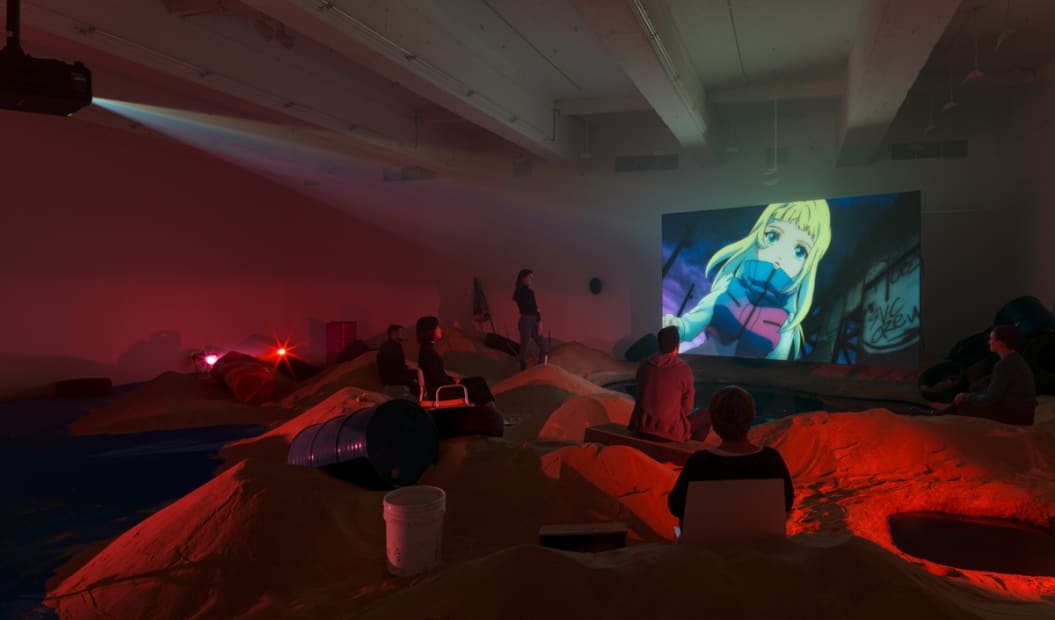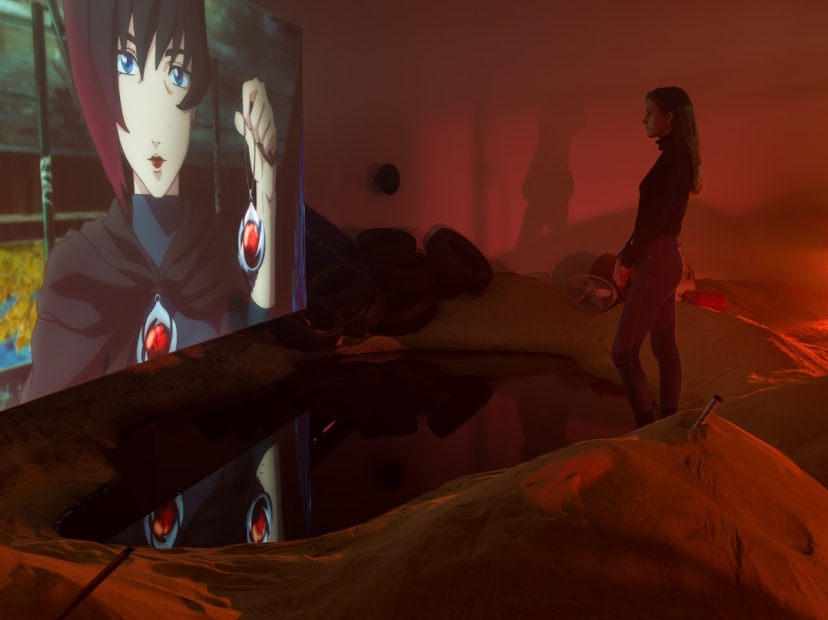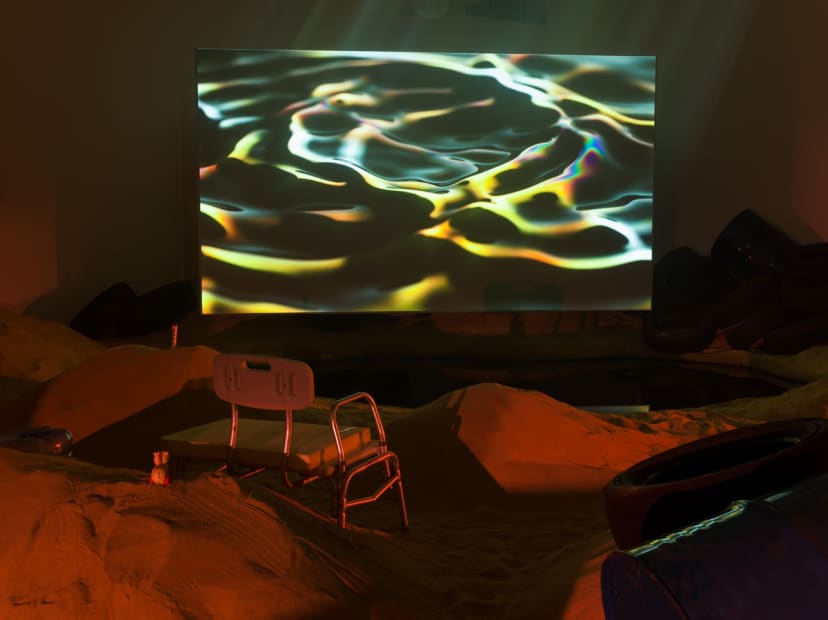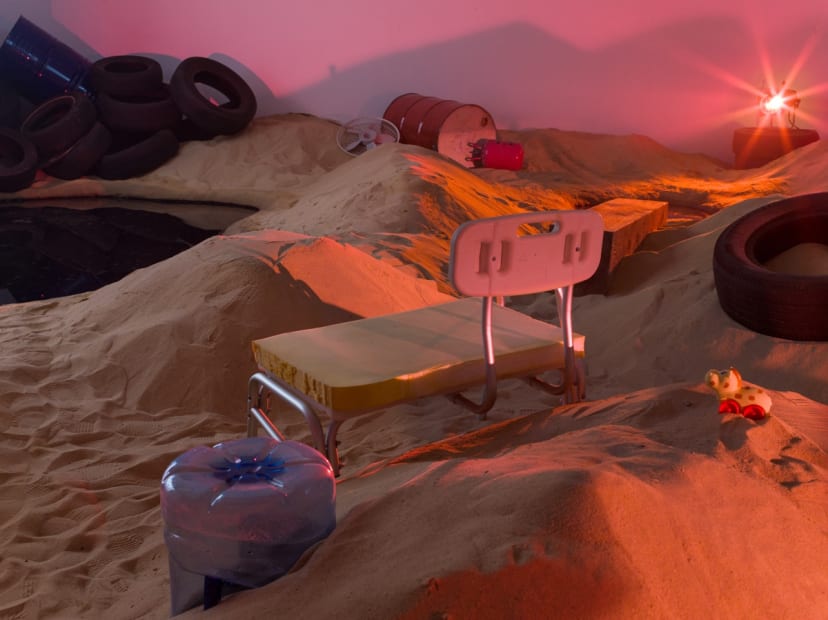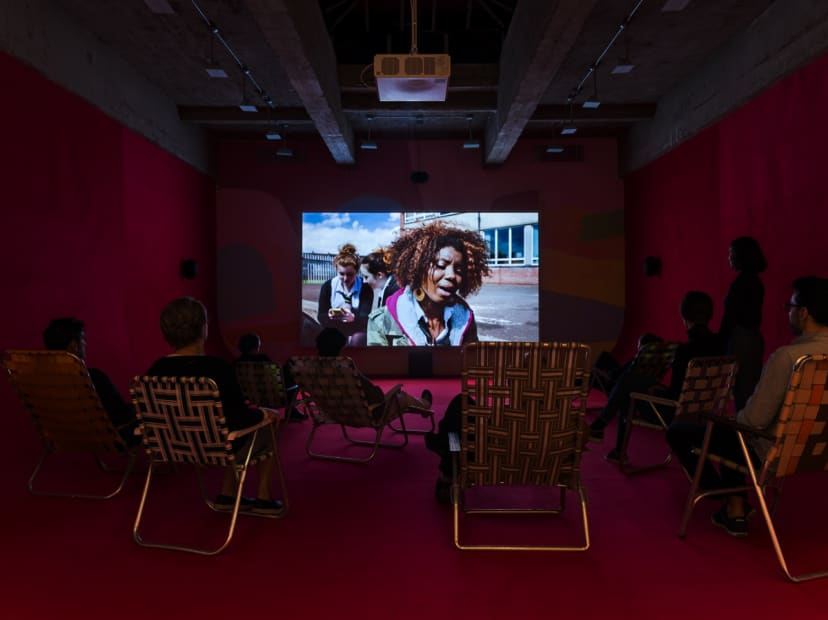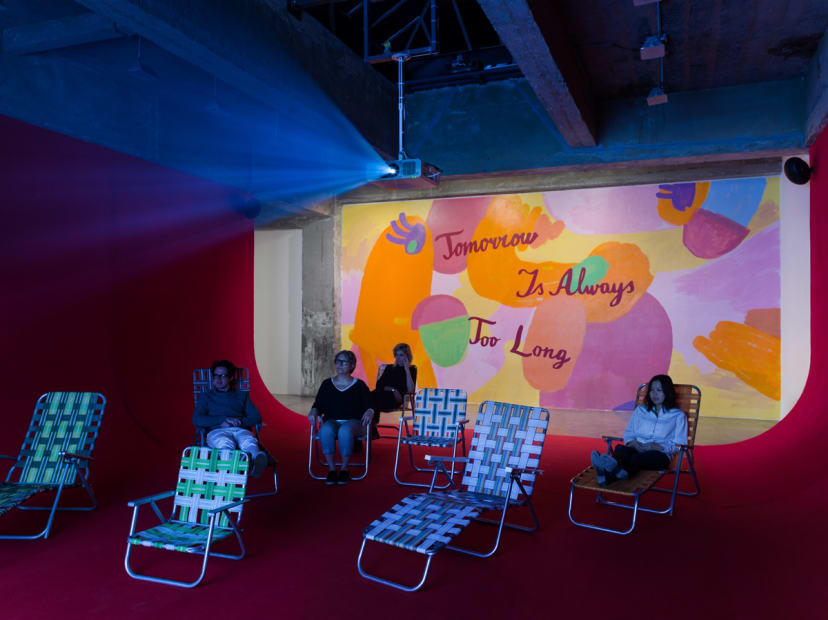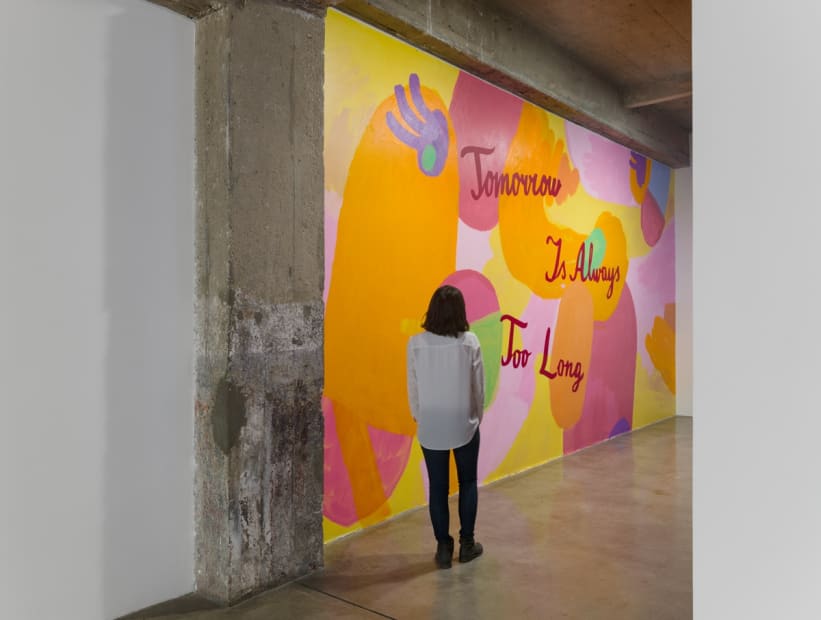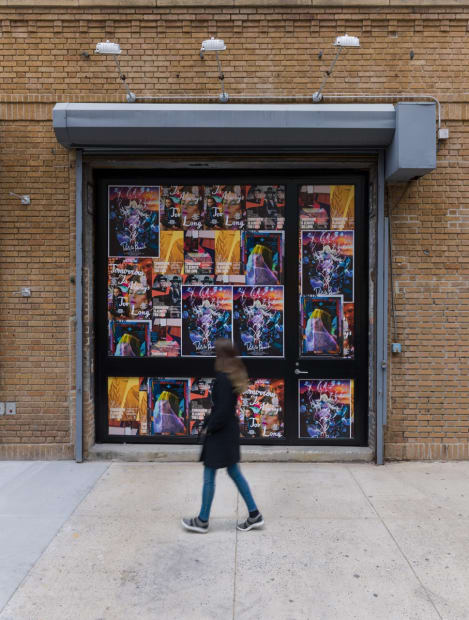PHIL COLLINS: Tanya Bonakdar Gallery, New York
Tanya Bonakdar Gallery is pleased to present a new exhibition by British artist Phil Collins, on view from November 2 through December 16, 2017. The artist’s fourth solo presentation with the gallery, the exhibition brings together two recent projects that traverse the interstices between pop and politics, and reflect on aspects of shared experience across a range of institutions and everyday situations. These ambitious new works pull into focus Collins’ unwavering dedication to pop music as both a site of encounter and a mode of exchange, his singular approach to working with non-professional protagonists, and his inspired reimagining of familiar narrative and cultural formats, in this case anime and the musical.
Presented as a large-scale installation in the ground floor gallery, Delete Beach (2016) is an anime set in the near future that tells the story of a schoolgirl who joins an anti-capitalist resistance group. In a society where carbon-based energy is outlawed, petroleum is the fighters’ refuge. They abuse it, squander it and hand their bodies over to the sea, in the hope of their selves literally becoming fuel for the upcoming struggles of future generations. The film proposes a scenario describing the decline of the oil economy, in which the prosperity of the boom years is coming to an end and the necessity of infrastructural changes looms large. These themes are connected to a wider question of our relationship to nature and a close—though up until recently frequently overlooked—link between fossil fuels and social relations. This is an important confluence implied by the dual meaning of the word “power” which, in the English language, applies to both thermodynamics and the interpersonal, at once a current of energy and a structure of domination.
As an art form, anime has repeatedly addressed eco-feminist themes, often through the lens of complex female characters. Some of its most memorable titles are formulated around these concerns. In Delete Beach a curious paradox is at work: society has seemingly reached an advanced state of non-dependence on carbon fuels, yet it continues to toil as before under a regime of oppression, inequality and control. Following anime’s recognizable aesthetic and storytelling strategies, Collins’ collaboration with STUDIO4°C, one of Japan’s leading animation studios (Tekkonkinkreet), and pop auteur and film composer Mica Levi (Under the Skin, Jackie) brings to life a world at once familiar and disquietingly corroded, left unmoored of any certainty after the end of an oil-dependent economy. It is a world, much like our own, blighted by incessant technological progress and insatiable imperative of growth. As presented in the gallery, Delete Beach is conjured up as a melancholy shoreline, crashing in from another dimension to play host to an expanded animation environment. The film alternates between Japanese and English language versions, with interludes featuring specially composed music and light sequencing.
Accompanying the sprawling installation on the ground floor, a series of lithographs in the project space upstairs is based on individual animation cels from the film. Transferred from the original drawings and pressed onto handmade mulberry tree paper, the prints retain the delicacy and tactility of the human touch, and evoke anime’s indirect connection to older graphic traditions.
The main gallery on the upper floor hosts Tomorrow Is Always Too Long (2014), a documentary musical which Collins developed over the course of a year with various communities and public institutions in Glasgow. A paean to Scotland’s largest city, this complex and absorbing feature-length work riotously interweaves genres and visual styles to summon up the poetry of the everyday. In between archive footage of Paul Robeson’s May Day visit in 1960, adult silhouette animations by Matthew Robins, impromptu broadcasts from a disused TV studio, and an electronic soundtrack by Mogwai’s Barry Burns, a cast of non-professionals perform songs by Welsh pop star Cate Le Bon with a symphonic accompaniment by the Royal Scottish National Orchestra. The musical sequences describe the arc of human life, from birth and youth through education and the criminal justice system to old age, in the technicolour hues of a musical and the visual language of a pop video.
The film's diverse yet unified character mirrors the city’s inhabitants who break into song amid a sensory overload of public-access-style channel surfing. “For me, there’s a transformative power in a pop song, an ability to tilt even the most mundane situation into the realm of the extraordinary and of heartbreak,” says Collins, “It's a form of artifice in some ways more authentic than ‘real’ emotion. So I wanted to imagine the real through this frame, and make something in which song emerges from a living, breathing, working space.” For the duration of the exhibition, the film will run continuously preceded by an intermission starring Golden Teacher, local voodoo-rave sensations. Moving between musical, documentary and animation with conviction and ease, Tomorrow Is Always Too Long paints a day in the life of the city as an intoxicating psychedelic symphony and captures ordinary moments when they take on cinematic proportions.
Phil Collins lives and works in Berlin and Wuppertal. He is Professor of Video Art and Performance at the Academy of Media Art in Cologne. Since the late 1990s, his varied practice has been recognized for its engagement with social reality and lived experience. Collins’ works are represented in notable international collections including Metropolitan Museum of Art, New York; Museum of Modern Art, New York; Solomon R. Guggenheim Museum, New York; Museum of Fine Arts, Boston; Tate Gallery, London; National Gallery of Canada, Ottawa; Walker Art Center, Minneapolis; Museum of Contemporary Art, Chicago; Dallas Museum of Art; Carnegie Museum of Art, Pittsburgh; Irish Museum of Modern Art, Dublin; Moderna Museet, Stockholm; Gallery of Modern Art, Glasgow; Museum Moderner Kunst Stiftung Ludwig and Thyssen-Bornemisza Art Contemporary, Vienna. The artist's solo exhibition my heart’s in my hand, and my hand is pierced, and my hand’s in the bag, and the bag is shut, and my heart is caught is on view at the Museum of Contemporary Art, Cleveland through January 28, 2018. Earlier this year, Collins completed Ceremony, a major new commission for the Manchester International Festival. For this project, a decommissioned Soviet-era statue of Friedrich Engels was brought from the Ukraine to the UK and inaugurated in Manchester city center where it remains as a permanent installation. A film documenting this process and the statue’s inauguration will be broadcasted on November 5 on BBC4 as part of a season marking the centenary of the Russian Revolution. On November 10, the soundtrack for Delete Beach is released by DDS as a limited edition double 10” vinyl.
Delete Beach was commissioned by Bergen Assembly, with support from Vestnorsk Filmsenter and in co-production with HAU Hebbel am Ufer Berlin. Tomorrow Is Always Too Long was commissioned by The Common Guild as part of Festival 2014.
All installation images above: Photo by Maris Hutchinson
